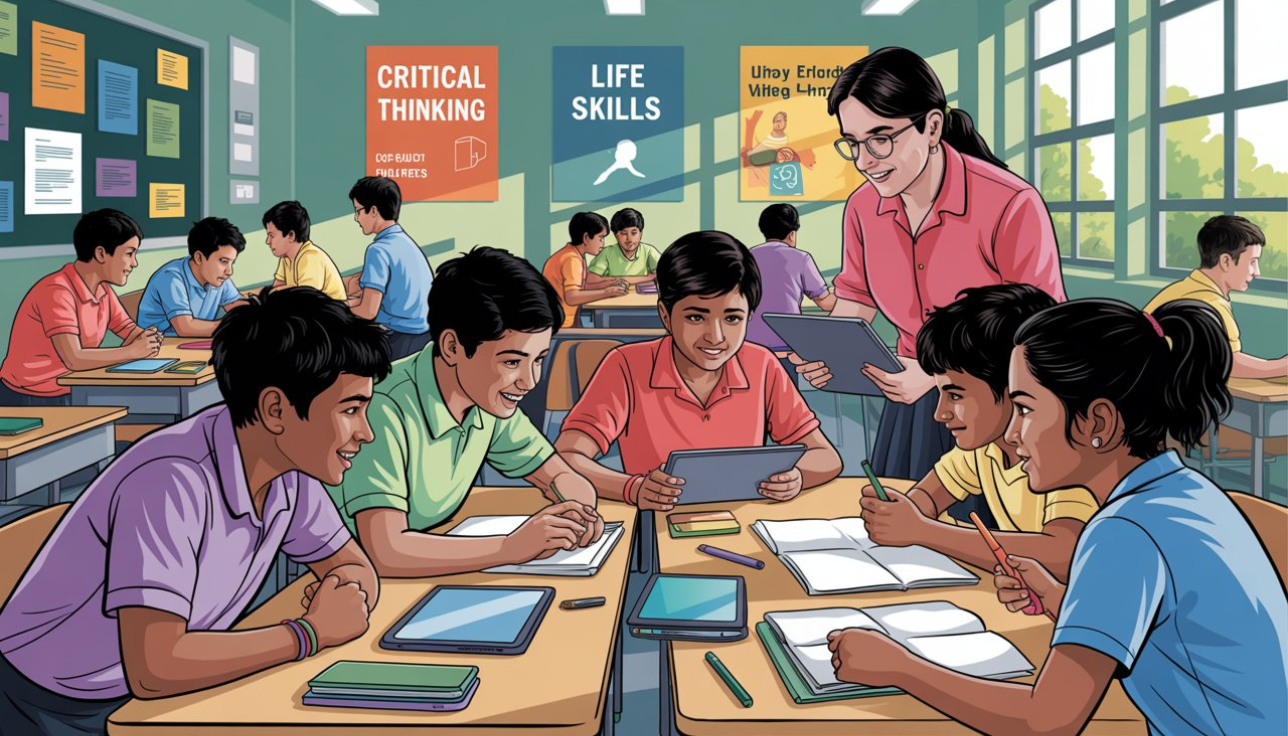



Understanding the New CBSE Assessment System: How It Benefits Students
To keep pace with a world that is constantly evolving, education is always transforming. The CBSE Board is focused on enhancing student learning. The new system of assessment in CBSE is aimed to be more integrated and student friendly in terms of improving the thinking and problem-solving abilities of students during examinations. How are students changing and what are the benefits presently available to them? Also, let us understand.
The New Approach Towards Assessment – Shift from Rote to Concept Based Learning.
For The New CBSE Assessment System Almost every single assessment requires some degree of skill with the use of concepts – the reason your grades will suffer without application of comprehension and logic is because enormous amounts of text are no longer able to be blindly regurgitated. Students have had to strive to get highly satisfactory marks through rote learning, but now passable grades require a definition of more comprehended critical application of understanding. Nevertheless, the system encourages more knowledge and comprehension along with critical thinking with the knowledge acquired. How does it benefit students:
- Promotes thinking and reasoning mathematically and logically.
- Has the potential to reduce last minute memorization and cramming.
- Increases the level of preparedness for competitive exams such as JEE, NEET, and CUET.
The introduction of Competency Based Questions
Competency-based questions have been introduced by CBSE, which focus on the ability of students to apply concepts in real life scenarios. Such questions require higher-order thinking skills other than rote memorization.
What students gain from this change:
- Fosters analytical and practical reasoning capabilities
- Stimulates creative and self-guided learning
- Improves decision making and problem-solving capabilities
Balanced Internal and External Assessments
Previously, students depended on final exams as the sole factor determining their overall academic performance. The new assessment structure guarantees a more balanced evaluation that integrates:
- Formative assessments
- Regular tests
- Project work and practical work
- MCQ and case study questions
Benefits of this approach:
- Minimizes the stress caused by single, high-stakes examinations
- Supports learning from earlier in the term and reduces the incentive for ‘cramming’
- Gives chances to students to better their performance during the year
Greater Emphasis on Life Skills and Holistic Integration
For a long time, CBSE has focused on multidisciplinary education. However, the new evaluation system shifts the focus on life skills, soft skills, and value-based education. Schools have begun to evaluate students in terms of their communication, collaboration, leadership, and emotional skills.
Significance:
- Equips students for challenges they will face in the workplace
- Develops confidence and social skills
- Motivates creativity and flexibility among students
Changes in the Marking Scheme and Evaluation Process
The marking scheme has also been changed in order to make it clearer and more student friendly. Some of the most important changes are:
- Lesser emphasis on marks for memory-based questions
- Greater emphasis on marks for case studies and practical work
- Marks for writing and creative composition have been added
How the changes help the students:
- Stimulates creativity and focused learning
- Lessens reliance on manufactured answer booklets
- Improves balance in marking standards
The Beginning of Open Book Assessments and Internal Projects
In a bid to enhance learning, CBSE is gradually incorporating open-book assessments and project-based evaluations. These methods allow students to refer to textbooks while answering questions, enabling greater emphasis on applying concepts rather than rote learning.
How students benefit:
- Promotes comprehensive understanding as opposed to rote learning
- Improves research and analysis skills
- Builds ability to relate theoretical knowledge to real life situations
Personalised Learning and Choice Based Education
With the introduction of flexible subjects, CBSE has completely revised the curriculum structure. Students can now take skill-based subjects in addition to other traditional ones, enabling them to pursue areas in which they excel.
Advantageous for students:
- Helps students to focus on their areas of interest
- Equips them for specialized careers in AI, Coding, Entrepreneurship, and Creative Arts
- Lessens the burden of having to study subjects which they are not interested in
Fostering An Environment of Learning and Growth
Schools are adopting new and novel methods to plan. The new CBSE system addresses learning in a holistic manner by implementing adaptive learning, which focuses on recognizing the strengths and weaknesses of students and altering the teaching styles accordingly.
What this means for students:
- A supportive and customized experience
- Enhancement in academics without additional stress
- Emergence of a lifelong learner
Better Preparation for Higher Education & Global Careers
Numerous students wish to study abroad or pursue global careers. Under the updated CBSE system, students stand in better regarding international education levels, which in turn helps them gain admission to universities abroad.
Key benefits:
- Better understanding of case-based and analytical evaluations practiced abroad
- Improvement in learner’s critical thinking and communication skills
- More chances of obtaining scholarships or gaining admission abroad
The Road Ahead: How Schools & Parents Can Support This Change
It is essential for both parents and schools to put in a joint effort if the new CBSE assessment system is to be effective and functional.
What schools can do:
- Implement training sessions for teachers on project-based learning and innovative assessment practices.
- Motivate students to actively participate in debates and project-based learning.
- Make materials available for experiential and hands-on learning activities.
What parents can do:
- Start concentrating on learning outcomes, not just the marks scored.
- Motivate children to learn new concepts and skills.
- Make it possible for children to study at home without putting them under undue pressure.
Conclusion: A Brighter Future for CBSE Students
The newly proposed CBSE assessment system is welcoming progressive changes from Indian education patterns as it tries to eliminate ways of learning which are defined purely by scoring marks and leans more towards flexible learning that emphasizes on skills, concepts, and continuous application such as conceptual grasp, real-world context, and realization. This system enables students to move beyond being exam ready to becoming future ready. As parents, educators and students begin to accept the shift in approach taught, it gives rise to a more inventively robust and productive generation which is bound to succeed.
Are you ready to embrace the future of education? The new CBSE system is all set to change the face of learning, one child at a time!

 frequently Asked Questions
frequently Asked Questions